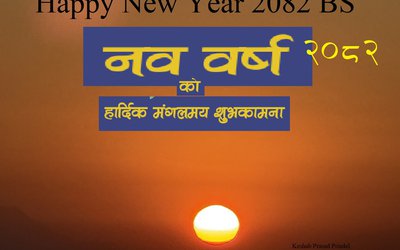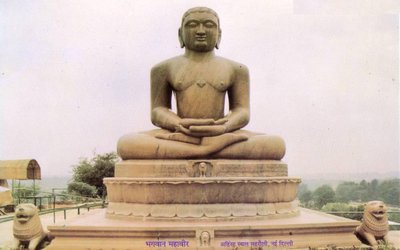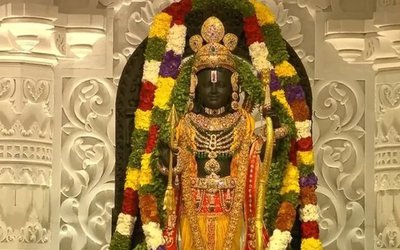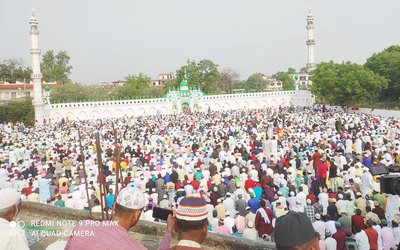
The people in the Tharu community, mostly from Dang to Kanchanpur in west Nepal, are observing Maghi, the greatest festival of the community. The Tharu community observes this festival with much fanfare and gaiety for five consecutive days.
Maghi festival is celebrated as the New Year by sharing the sweet dishes and performing cultural dance and selecting community leaders known as Bhalmansa.
The Sakhiya dance performed with the tune of madal (hand drum) is popular among Tharu community people of all ages for centuries, which demonstrates the costumes, traditions and folk culture of Tharu, Man Bahadur Chaudhary, a leader of Tharu community from Kailari of Kailali district said.
Each and every household is preparing for the celebration of Maghi festival here, according to Chaudhary. Chaudhary is also a Bhalmansa, a leader of the Tharu community who decides the key issues at the community.
Celebration of the Maghi festival is not likely to be a personal decision by going beyond the decision of Bhalmansa.
The people should manage meat, especially pork, a day before Maghi festival while the women remain busy cooking local dishes including Jaad and Dhikri.
Dhamar and Dumru dances are also equally popular in the Tharu community in this festival.
Prem Chaudhary, a journalist from the Tharu community, said that the Tharu people have already slaughtered pig in every house for the celebration of this festival.
Likewise, the married women have visited their maternal home to reunite with their parents, brothers and relatives to celebrate the Maghi festival, he added.
Furthermore, selection of Bhalmansa is equally crucial in the village during the Maghi festival. The tradition of Bhalmansa carries a great significance since the post has to carry some vital responsibilities in the community. The people here pick Bhalmansa unopposed if an agreement was forged but election and lottery draw are also exercised.
Similarly, a community postman known as Chirkiya, and Guruwa to serve as a community health worker are also selected who perform their jobs under the leadership of Bhalmansa.

In general, these leaders oversee the overall tasks of the community including protection of the village, development works, irrigation, drinking water supplies, power supplies and other issues that could surface in the community.
Defiance of the orders of Bhalmansa is considered as violation of social norms in the Tharu community and every individual should abide by the directive of Bhalmansa since this helps maintain discipline and collectivism in the community.
Amid the bone-chilling cold, the Tharu settlements of the southern plain have become vibrant with traditional dances and songs. From the children to the elderly, all are enjoying the Maghi festival, their annual festival.
Maghi, the great festival for the Tharu community has made the Tharus, the indigenous people of the Tarai, enthusiastic, as they are set to celebrate their festival, which is also the new year day for them.
The Tharu settlements are alive with Maghauta dance, Dhamar and Dhumru songs. Draupati Chaudhary, a resident of Bhada Village of Dhangadhi Sub-Metropolitan City-16, said that the traditional Maghauta dance brightened her village.
In the Tharu community, it is customary to celebrate the Maghi festival with much fanfare from the last day of Poush month to the second day of Magh month. On the first day, it is celebrated ‘Jita Marne’ in the morning, and delicious pork dishes are cooked.
The first day of Magh is the last day of Tharu Sambat, there is a tradition to celebrate this day forgetting all the sufferings of the whole year.

Magh 1 marks the beginning of the New Year for the Tharu community. Tharu Sambat 2647 will start on Monday. On this day, people of this community wake up early in the morning and take holy baths in nearby rivers, ponds and streams and take blessings from the elders.
People exchange greetings forgetting anger and jealousy and they eat meat, Dhikri, yam and other varieties of food.
The last day of the festival is called ‘Khojnibojni’. On this day, the previous financial year is reviewed and plans are made for the new year. Similarly, there is a tradition of selecting the leader of the village on this day.
Magh is also a festival of independence for the Tharu community. Before the abolition of Kamaya system, Kamaiya and Kamalhari used to change the owner’s house only during the Maghi festival.
Bismati Devi Chaudhary of Vani Mukta Kamaiya Settlement of Krishnapur Municipality-2 said that the festival is celebrated as a festival of freedom as a new chapter is believed to start in the life of Free Kamaiya and Kamalhari since Magh.
After Maghi festival, marriage, construction of new houses and other works begin in the Tharu community. According to Tharu leader Dil Bahadur Chaudhary, Magh is a festival of religious, cultural, social and economic importance.
Similarly, In Nepalgunj, the Tharu-dominated villages of Banke and Bardiya have now become vibrant with the arrival of the festival.
Ram Lakhan Tharu, ward chair of Raptisonari Rural Municipality-7 in Banke, said that the festival of Maghi, which is celebrated as the New Year by the Tharu community, started in the villages a week ago.
He said that this festival is celebrated by the Tharu community as Badka Tauhar (big festival) festival. People who did not go home during the Dashain and Tihar have also returned home to celebrate Maghi.
- Minister Dahal Directed To Complete The Dannune Portion Of Road Before Monsoon
- Apr 18, 2025
- Kanchenjunga Diamond Festival Being Celebrated From Today To Mark The 70th Anniversary Of The First Successful Ascent
- Apr 18, 2025
- RPP To Hold Protest In Restricted Areas Of Kathmandu On April 20
- Apr 18, 2025
- Weather Forecast: Partly Cloudy With Rain And Thunder In Kathmandu, Pokhara, Biratnagar And Janakpur
- Apr 18, 2025
- Himalaya Airlines continues its CSR bonding with Prayas Nepal children
- Apr 17, 2025















